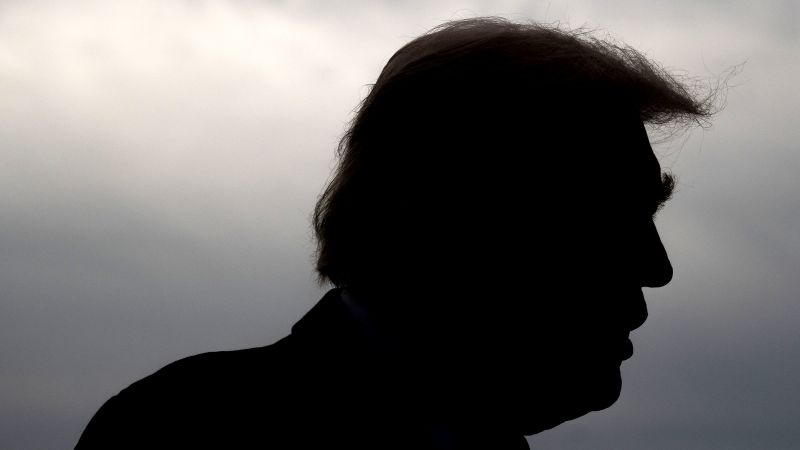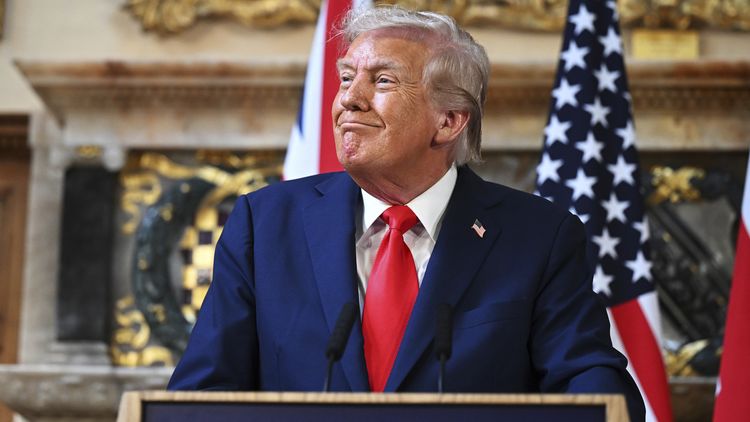
Corporate America is proving to be a lame defender of free speech — even its own — against the ruthless power plays of the Trump administration.
The icing of Jimmy Kimmel’s late-night ABC talk show is just the latest bombshell moment when firms — caught between their profits and suffering through a painful journey through treacherous MAGA politics — have rushed to fold.
It’s the most tangible consequence yet of the Trump administration’s promised crackdown on opponents in the wake of the assassination of Charlie Kirk. Kimmel was indefinitely pulled off the air after he claimed that the Trump administration, right-wing media and the MAGA movement were trying to manipulate the alleged killer’s motivations for political gain.
In some ways, big corporations are being caught in a cultural vibe shift and are increasingly keen to avoid alienating politically active chunks of their consumer base and advertisers at a time when politics is so vicious that many people just want to switch off.
On Wednesday, for example, news broke that Jerry Greenfield, the co-founder of Ben & Jerry’s ice cream brand that has long advocated social causes, had left the brand. Greenfield accused parent company Unilever of curtailing the right of Ben & Jerry’s to speak out on political issues.
But the current pressure on free speech goes beyond firms making business decisions to try to shield themselves from adverse political sentiment.
Businesses are also being jammed by an administration that wields aggressive — critics say authoritarian — power, and is using the leverage of media mega-mergers and consolidation in the news and entertainment industries to silence speech it doesn’t like. Trump is seeking to impose his politics on the corporations that drive the country’s economic wealth and to use his political pulpit and base to punish those who fight back.
The purge marks a significant shift in conservative politics. Its prominent thought leaders — including Trump and members of his administration — have long railed at what they say is censorship and the stifling of their free speech. Now, the new MAGA cancel culture is fused with government authority to shut down Trump critics and to shame corporate bosses into submission. Freedom of speech is in the eye of the beholder.
Trump’s bullying is especially noticeable because it comes against the backdrop of a wider campaign to coerce his political opponents. Overnight into Thursday, the president vowed to crack down on Antifa, an umbrella group of far-left organizations that he claims, without evidence, is financing domestic terrorism. The administration has also claimed that left-wing groups and even Democrats were responsible for political rhetoric that led to Kirk’s killing.
Trump’s arguably anti-constitutional action came as he was staying at Windsor Castle, a favorite residence of the British monarch whose whims and dictatorial decrees sparked the American revolution 250 years ago.
Corporations climb down
Trump’s swipe against Kimmel looks a lot like cherry-picking free speech suppression for political gain. And the corporate world is proving even more pliable, in many cases, than law firms and universities that complied with the administration’s diktats in order to safeguard their client bases or financial bottom lines. Companies don’t have to submit, but the pain of resistance is leading them into making choices that only encourage a strongman president to seek fresh targets for his ideological iron fist. Consequently, some of the guardrails of a democratic society — including the First Amendment rights of every American — are coming under increasing assault.
Kimmel’s show was suspended after Federal Communications Commission chair Brendan Carr on Wednesday issued an unsubtle threat to ABC and its affiliates that they must act against a comedian who has long lampooned Trump on his show. He implied that public broadcast licenses could be at risk. The cave came in hours.
It’s not hard to follow the money trial. Nexstar — one of the affiliate groups that threatened to pull Kimmel’s show, forcing the hand of ABC’s corporate leaders at Disney — is seeking to merge with another station conglomerate, Tegna. It needs the Trump administration’s approval to do so.
Kimmel has few legal grounds to challenge his benching. ABC News could fire him on multiple grounds or just choose to end his show, depending on contractual arrangements. And ABC’s use of public airwaves gives the administration control that it would lack if Kimmel were on a cable network or had a social media platform.
The firm and its parents could have resisted government efforts to shut down Kimmel’s show on the grounds that the government is using its power to suppress the companies’ First Amendment rights to free speech. But the public arm-twisting by Carr made the cost of such an option perfectly clear.
The Trump administration is especially keen to target media firms as it seeks to suppress criticism of its own streams of misinformation or simply to spare the president from mockery on late-night comedy shows with which he’s long feuded.
Trump scored a win over “60 Minutes” in his dubious lawsuit against the iconic show. His legal action coincided with an ongoing merger between CBS’ parent, Paramount, and Skydance. With billions of dollars riding on the merger, then-Paramount boss Shari Redstone opted for a settlement with the administration.
And CBS recently canceled “The Late Show With Stephen Colbert,” insisting it did so to cut costs. But many media commentators believe it did so to muzzle another Trump critic.
Trump surveys corporate landscape for more culture warfare wins
The president is keen to enforce his writ far beyond the media industry, seeing a chance to leverage culture-war politics on behalf of his base — sometimes as a distraction from his political crises like the Jeffrey Epstein scandal and slowing US job creation.
When Cracker Barrel last month faced criticism over a logo change that ditched its classic old man and a barrel branding, it created a political uproar. Trump was quick to weigh in — and to claim credit when the decision was reversed. Cracker Barrel was especially exposed because its highway-side restaurants are often in rural, heartland areas where voters predominantly vote Republican.
Other firms are also choosing to bend to Trump’s sometimes idiosyncratic demands, fueling claims he’s acting like a dictator and that the companies are complicit in destroying the fundamental American values — such as free speech and open, rules-based commerce — that turned them into business titans in the first place.
Trump announced in July that Coca-Cola would produce a version of its classic soda using cane sugar cultivated in the US, a move that speaks to both MAGA and MAHA values.
Trump is also directly intervening in US businesses, flouting traditions of non-interference followed by Republican presidents for years. He just demanded and received a revenue-sharing stake for the US government in revenues piled up by mighty chip maker Nvidia. When Trump threatened to impose huge tariffs on Apple, CEO Tim Cook showed up to the Oval Office with a gold-plated sculpture for the president.
But bending to the new political currents can also have a cost. Target got hit by a consumer boycott that that hammered its share price after it pulled back diversity, equity and inclusion efforts that were under fire from the new administration.
The case was a mark of how the cultural and political pendulum can swing sharply according to election results. It was also a warning that in seeking to appease one sector of its consumer base, a company can alienate others.
It’s only a few years ago, after all, that US firms were racing to implement DEI programs and taking steps like ostentatiously celebrating Pride weeks and tacking toward more liberal causes, especially in the wake of Black Lives Matter protests after the murder of George Floyd by a police officer in 2020.
While conservatives are running the show now, the aggressive steps taken by the Trump administration against their political opponents raise the possibility of reverse pivots against right-wing causes the next time a Democrat is president.
But that’s not going to happen for at least three and a half years. Before then, Trump’s aggressive leverage on US companies and media outlets may irrevocably change American corporate life.



